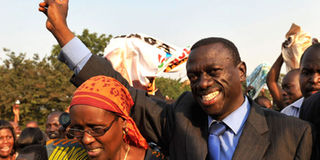Besigye can win if he takes regions

Ugandan opposition leader Kizza Besigye and his wife, Winnie, greets the crowd at a rally in Kampala, Uganda on February 16, 2011, the last day of campaigning for presidential elections. Veteran President Yoweri Museveni predicted a landslide victory in polls this week, dismissing Besigye's assertions that Uganda was ripe for an Egypt-style uprising. AFP PHOTO/ROBERTO SCHMIDT
Ugandan President Yoweri Museveni faces seven opposition candidates in Friday’s election.
Dr Kizza Besigye of the Forum for Democratic Change (FDC) the top opponent, is challenging Museveni for the third time.
Other candidates are: Norbert Mao of the Democratic Party and Olara Otunnu of the Uganda People’s Congress (UPC).
Also in the running are Bidandi Ssali, 73, of the People’s Progressive Party, who served as a minister in Museveni’s government from 1986 - 2005, and Ms Beti Olive Kamya, a former senior official in Dr Besigye’s party, currently recovering from major surgery.
Also competing are: Samuel Lubega, 43, an independent candidate and former DP stalwart and Mr Abed Bwanika, 38, who ran in 2006 and got less than 1.0 per cent of the vote.
To win Friday’s poll Dr Besigye needs to a draw in both Busoga and Bunyoro, at 50 per cent.
The opposition candidate would then need to turn the tide in Bugisu/Tororo and Bukedea into a 60 per cent win for him and then drive the nail home in Buganda by translating his support into 60 per cent of the votes in Kampala and 55 per cent of the votes in the rest of Buganda.
With such a strong showing from the rest of the country, Dr Besigye could afford to lose Ankole and Kigezi with only 30 per cent of the vote but would have enough to scrape through with a 52-53 per cent win of the overall vote.
The underlying assumptions here are that Besigye is able to keep a grip on his power base and erode Museveni’s support in three key areas; Buganda, Bunyoro and Busoga.
If he improved his numbers in Ankole/Kigezi and in Buganda, he could afford to lose marginally in one of the two areas (Busoga or Bunyoro) and still win the election.
Either way, it shows that the opposition candidate is in with a chance, if not to win the election, then at least to force a re-run – but it will take all he has to ensure he gets out the vote and protects it.
Meanwhile, if there is an issue that could singularly determine the direction of the election, it is the fallout between the central government and the Kingdom of Buganda.
Buganda has the largest bloc of votes (3,277,471) and has become openly hostile to a government it believes is out to destroy its 600-year kingdom, forming the Ssuubi pressure group led by a former prime minister in the kingdom to campaign for Dr Besigye.
Mr Museveni won Buganda with 70 per cent in the last election and the NRM strategy is to keep its grip on the cattle corridor districts of Kiboga, Nakaseke, Nakasongola and Ssembabule where its average score was 83 per cent.




